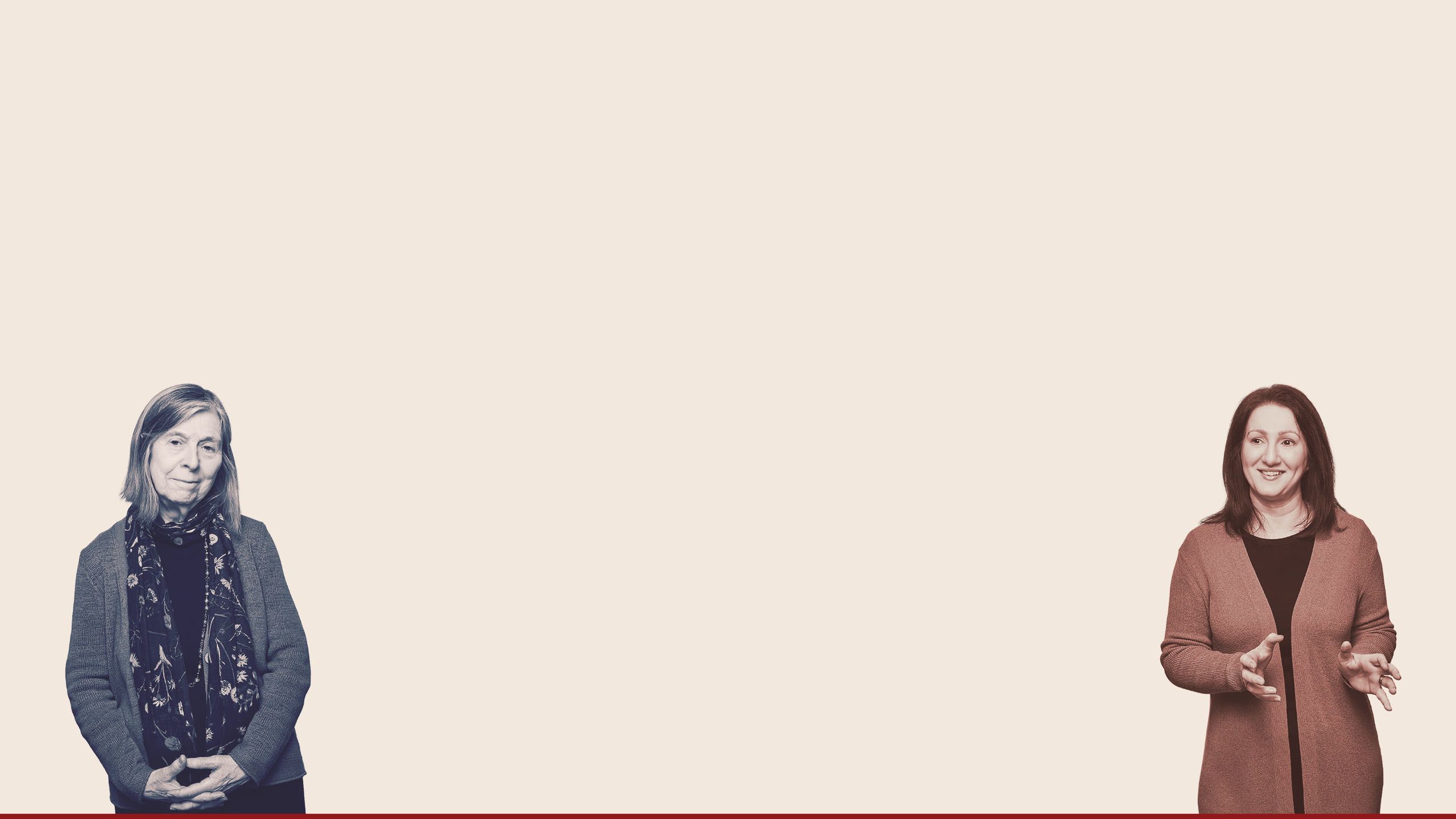Improving how screening tests are explained to provide an informed choice

When you’re offered a medical test or health screening, you’re typically given information to read and forms to complete. But how aware are you of exactly what’s involved? And how can health systems ensure patients are able to make truly informed choices? These are questions that drive Professor Jenny Hewison and Dr Shenaz Ahmed, whose partnership began when Jenny was Shenaz’s PhD supervisor.
Professor Jenny Hewison and Dr Shenaz Ahmed, share a passionate interest in what they see as a significant problem in the world of healthcare.
“Medical tests usually have pros and cons; trade-offs to consider and evaluate before you choose to proceed or decline,” Jenny explained.
“But they’re often incredibly scientifically advanced and complex, so when you come to speak to the patients or the public involved, do those recipients understand the true nature of what’s being proposed – and crucially, the potential advantages and disadvantages?”
While these questions may have been considered less in healthcare than they should have, the challenge is not just one of awareness or priority.
“You’ve got to understand the science, and also it can obviously be a profoundly personal dilemma – but the way in which someone looks at these questions and choices is obviously hugely influenced by the country they’re in, the culture they’re from, their educational background, and so on,” Jenny elaborated.
“So from a healthcare point of view, it becomes a matter of thinking about how you can put messages across that aren’t simplified to what you want to say, but reflect how they’ll be received by the recipient so they can enjoy a full understanding and get equitable information.”
For Shenaz, it all boils down to one simple purpose.
“My interest, ever since my undergraduate days, has always been in helping people make choices that are right for them.”
The pair have worked on a number of proposals which were successful in gaining funding. An award from the Economic and Social Research Council’s Innovative Health Technologies Programme was followed by further funding from the Economic and Social Research Council and also the Medical Research Council, in recognition of the value of their work.
The way someone looks at these choices is hugely influenced by the country they’re in, the culture they’re from, their educational background.”
Working together to maximise impact

Immersing themselves in this line of work is far from just a theoretical or lofty academic exercise for Jenny and Shenaz. Impact is far more important than the awards. This means doing work that benefits people by helping them understand their choices and make truly informed decisions about the tests they are offered.
“I remember finding something strange in some NHS data while I was doing my PhD, which indicated something was happening that shouldn’t have been,” Shenaz recalls.
“I shared it with Professor Hewison and told her I was considering publishing it to draw attention to the issue, but she was very diplomatic and suggested arranging a meeting with the person at the top of this particular area in the health service instead.
“So I met them, they promised to sort it out, and sure enough, there was soon a huge difference in the way people were getting their services.
“I learned a valuable lesson that day – that what we’re trying to do is collaborate with healthcare professionals, rather than call organisations out in the first instance, to genuinely support patients and people.”
It’s a great example of how Jenny and Shenaz’s efforts have influenced policies and processes both in the UK and abroad.
“Traditionally, research excellence was judged on what other academics thought of your work; we were all marking each other’s homework,” Professor Hewison added.
“It was boiling down to how often your work is referenced by others, conference presentations – not whether you had any impact outside of academia.
“But now, assessing quality is moving in that direction, with the big research funders wanting to understand what’s been improved and how it’s benefited the public.”
That’s why in 2021, together with Professor of Psychological and Social Medicine Louise Bryant, Jenny and Shenaz submitted an impact case study to the Research Excellence Framework (REF).
The REF is the UK’s system for assessing the excellence of research carried out by UK higher education providers – and the difference it can make – and inclusion can help academics attract future funding.
The case study summarises the researchers’ work and impact, including the resources they created which are now given to around 700,000 pregnant women in England every year.
Jenny and Shenaz also helped shape the content of training around informed choice for NHS staff who deliver screening and supported the development of culturally appropriate information about some screening choices in Pakistan.
Their published findings even led Public Health England (and later Public Health Scotland) to rethink some of their screening policies.
It’s meaningful evidence of how Jenny and Shenaz’s passion and dedicated research is translating into real-world impact in hospitals and healthcare to ensure everyone is informed as effectively as possible.
Above all, Jenny and Shenaz know better than most that the decisions people make about screening tests are – and should be – theirs and theirs alone.
“People come with their own values and opinions,” Dr Ahmed said. “They often differ, and it’s not the case that one type of opinion is ‘right’ and another is ‘wrong’.
“Our job is to cater for everyone. Don’t want to have testing? That’s absolutely fine. Don’t want to even read the information? That’s absolutely fine too – but at least it is there in the first place, and someone else who does want to read it can do so.”
Understanding perspectives

Jenny is an experienced researcher, having held academic posts at universities in London, Durham and Newcastle in addition to her current position in the School of Medicine at Leeds.
But serving as a research commissioner has also allowed her to see things from both sides of the table, giving her different perspectives of academic work and environments.
“The fundamental challenge of developing your research career is knowing how to ask a question not just so you can get a quality answer to it, but so that somebody is interested in it enough that they might support the work,” Jenny explained.
“There’s a stereotypical view that good research is about excellent ‘individuals’, but in my experience that is fundamentally not what it actually looks like.”
Instead, the real picture is far more collaborative – and self-critical.
“When you’re presenting your ideas to an external body, such as a potential or current funder, what matters is understanding what they want or need, as well as not being afraid of saying that some of your earlier plans have not worked out, for example, ‘I made a mistake there’ and ‘next time, I’d look for more support here’”.
Shenaz, who gained a first-class BSc in Psychology at Leeds in 1998 and has been at the University ever since, can relate.
“Over the years I have managed to get research done, but it has been a real struggle at times to get funding,” she said.
“As my PhD supervisor, Jenny explained a lot about how collaboration was really valued by the University and how collaborating with those in other disciplines to make a team can make a difference, which was incredibly helpful.”
Jenny and Shenaz’s research and its impact certainly demonstrates the value of a collaborative approach.
If you’re interested in learning more about this area of research including future collaboration with Shenaz here at the University of Leeds, please email Shenaz at s.ahmed@leeds.ac.uk.
About Jenny
Professor Jenny Hewison is a Professor of the Psychology of Healthcare in the School of Medicine at the University of Leeds.
She is an applied health researcher and research methodologist with academic interests in the relationships between research methods, evidence and policymaking in healthcare, and the incorporation of patient perspectives into the evaluation and assessment of health technologies.
Prior to becoming a professor, Jenny read Natural Sciences at Cambridge before completing an MSc in Child Development and then a PhD in Psychology at the University of London.
About Shenaz
Dr Shenaz Ahmed is an Associate Professor in Public Health at the Leeds Institute of Health Sciences.
Her research interests are in the psychological, social and ethical aspects of prenatal and genetic testing; ethnicity and health, and the development of interventions to support healthcare decision-making.
She has expertise in global health research, particularly in low-middle income countries.